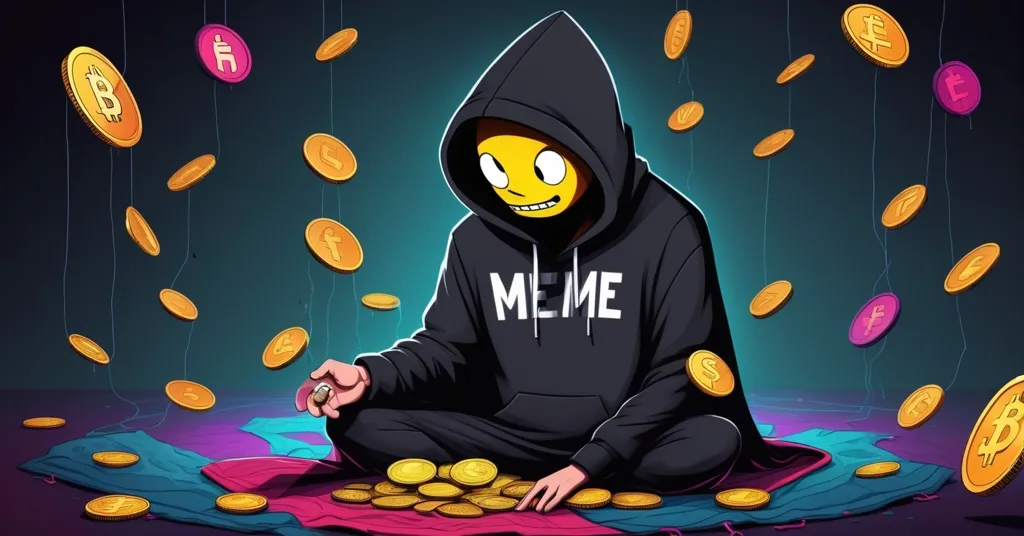Memecoin Scams Exploit Hulk Hogan Death Rumors and Ben Askren Recovery in Ruthless Rug Pulls

Memecoin Scammers Cash In on Hulk Hogan Death Rumors and Ben Askren’s Recovery with Ruthless Rug Pulls
Crypto scammers have hit a new low, exploiting unconfirmed rumors of WWE legend Hulk Hogan’s death and UFC star Ben Askren’s near-fatal health crisis to peddle fraudulent meme coins. These shameless rug pulls, fueled by hype and heartbreak, expose the ugliest side of the cryptocurrency space, preying on emotional triggers and leaving investors burned.
- Hulk/SOL Disaster: A “Hulk Hogan Tribute” token on Solana surged to a $7M market cap, then crashed 99.7% in under 24 hours.
- Ben Askren Exploitation: A “FUNKY” token, linked to serial scammer Sahil Arora, was promoted via Askren’s possibly hacked X account before collapsing to zero.
- Moral Decay: These scams spotlight predatory tactics in crypto, targeting vulnerable moments and eroding trust in the market.
Hulk Hogan Crypto Scam: A $7M Rug Pull on Solana
Let’s start with the disturbing case tied to Hulk Hogan, the iconic wrestler whose real name is Terry Bollea. Within hours of unverified rumors spreading about his passing, a Solana-based meme coin called “Hulk/SOL” was launched as a so-called “tribute” on decentralized exchanges, or DEXs. For those new to the space, meme coins are cryptocurrencies often inspired by internet trends or cultural figures, usually lacking any real utility and driven purely by speculation and hype. They’re frequently built on platforms like Solana due to dirt-cheap transaction fees and lightning-fast deployment options. Hulk/SOL skyrocketed to a jaw-dropping $7 million market cap in less than a day, propelled by emotional reactions to the news and what crypto watchdogs quickly flagged as bot-driven price manipulation—fake trading activity meant to simulate demand and lure in buyers. Liquidity, which refers to the amount of money in a token’s trading pool to support buys and sells, was also suspiciously thin, a classic red flag for a shaky project. You can explore more about the specifics of this incident through reports on Hulk Hogan death rumor scams.
Despite early warnings on social platforms about the token’s safety, investors—likely gripped by FOMO, or fear of missing out—piled in with reckless abandon. Then came the gut punch: the token’s creators pulled a rug pull, a scam where developers or insiders hype up the price before dumping their holdings, leaving latecomers with worthless digital trash. Think of it as a bait-and-switch at a shady carnival—scammers dangle the promise of big wins, then yank the rug out and vanish with your cash. Hulk/SOL cratered over 99.7%, shriveling to a measly $5.7k market cap with just $7.1k in liquidity. If that’s not a sucker punch to Hogan’s legacy—whether the death rumors are true or not—then what the hell is? For deeper insights into this specific token collapse, check out the Hulk/SOL scam breakdown.
Scammers didn’t stop at one token, either. Other NFT collections and meme coins referencing Hogan sprouted up across platforms, though none matched Hulk/SOL’s traction, with trading volumes barely making a dent. This isn’t even the first time Hogan’s name has been dragged into crypto filth. Last year, his X account was reportedly hijacked to shill a “Hulkamania” token, which also ended in a rug pull. That scam saw a brief revival amid the recent death rumors but peaked at just one-seventh of Hulk/SOL’s high before fading into obscurity. The playbook is painfully obvious: exploit emotional triggers around cultural icons for quick cash, rinse, and repeat. Background on Hogan’s past involvement in such schemes can be found in his public profile.
One glaring issue needs addressing upfront—there’s no independent confirmation of Terry Bollea’s passing in mainstream news or public records as of the latest updates available. This raises a chilling possibility: scammers might not just be capitalizing on real tragedy but fabricating it outright to fuel their schemes. If true, that’s a whole new level of depravity, turning fake news into a weapon for meme coin scams. How many more fans need to lose their shirts before we demand better protections on DEXs?
FUNKY Token: Exploiting Ben Askren’s Pain
If profiting off death rumors wasn’t vile enough, scammers also targeted recovery stories, as seen with former UFC fighter and Olympian Ben Askren. After spending nearly 60 days in the hospital battling severe pneumonia and undergoing a double lung transplant, Askren recently opened up about his harrowing ordeal, admitting he felt like he “died” multiple times during recovery. As he was rebuilding his strength, his X account—possibly hacked—started promoting a Solana meme coin called “FUNKY.” For clarity, Solana is a high-speed blockchain popular for meme coin launches due to its scalability and low costs, but it’s also a lawless jungle where scams thrive with minimal oversight on DEXs.
The FUNKY token, tied to known rug pull orchestrator Sahil Arora, was hyped for a hot minute before the deployer—likely Arora or an accomplice—sold off the entire supply for a pathetic $1,200. That’s right, one of the least profitable rug pulls in recent memory, but no less disgusting for its pettiness. Apparently, even scammers have off days—$1,200 is pocket change for a con artist of Arora’s caliber. The token’s value nosedived to zero, leaving investors with nothing but regret. Community outrage boiled over, with one X user, Slim Pick’em, nailing the sentiment:
“Ben was hacked. You have to be a real POS to take advantage of a dude who almost died multiple times in the last 60 days.”
They’re dead right. Targeting someone fresh out of a life-threatening ordeal isn’t just unethical—it’s predatory in the rawest sense. Sahil Arora, the alleged brains behind FUNKY, isn’t some one-off chump. He’s linked to a slew of celebrity scams involving names like Caitlyn Jenner, Rich The Kid, and Iggy Azalea, using a well-worn playbook: pre-buying token supplies with insiders, pumping prices through fake pre-sales or hype, then dumping everything while scrubbing Telegram chats to cover tracks. It’s a cold, calculated hustle, and FUNKY’s measly haul might just be a rare fumble in his otherwise lucrative fraud empire. Learn more about Arora’s shady history with projects like this in a detailed account of the FUNKY token scam.
Systemic Failures in Decentralized Exchanges
Stepping back, these incidents lay bare deep, festering flaws in the crypto space. Scammers waltz in and exploit high-profile names with nauseating ease. Whether through hacked accounts, outright lies, or spreading misinformation like unverified death rumors, they thrive in an environment where accountability is a dirty word. Decentralized exchanges, a bedrock of blockchain’s promise of freedom and autonomy, often lack basic vetting to filter out fraudulent tokens. Social media platforms like X are cesspools of misinformation, especially when public figures’ accounts aren’t locked down tight or when fake news spreads faster than truth. Community discussions on platforms highlight these security issues with celebrity meme coins on Solana DEXs.
Then there’s the human factor—why do investors keep swallowing this poison? It’s pure FOMO, celebrity worship, and zero research. Meme coin mania dangles the fantasy of 100x gains overnight, and many newcomers don’t grasp that a slick chart or a famous name doesn’t mean jack about legitimacy. Community warnings, like those sounded for Hulk/SOL, get buried under the hype machine, and folks only wise up when their portfolio turns to ash. Imagine a die-hard Hulk Hogan fan, moved by news of his rumored passing, tossing in their savings only to lose it all in hours. That’s the human cost of this garbage.
The Emotional Bait of Celebrity Tokens
Let’s not pretend this is a one-off problem. Meme coin scams have a long, ugly history of spiking around high-profile events or endorsements. Think back to Kim Kardashian’s Ethereum Max debacle, where a celebrity plug led to a pump-and-dump that left investors reeling. The pattern is the same—scammers hijack emotional or sensational moments to bait the masses. Sahil Arora’s tactics are a masterclass in predation: fake Telegram groups, burner wallets, and pre-sale scams where even the celebrities are often duped into believing they own a chunk of the token. Reddit threads from the Solana community detail how Arora’s schemes with names like Iggy Azalea netted thousands of SOL in profits, dwarfing FUNKY’s pitiful take. This isn’t chaos; it’s a business model. For a broader perspective on how these cons work, see this discussion on celebrity exploitation in crypto scams.
These scams also taint crypto’s reputation at a time when we’re fighting for mainstream acceptance. Every rug pull, every heartless exploitation, fuels the narrative that this space is a digital jungle where predators roam unchecked. As someone who leans toward Bitcoin maximalism, I’ll argue that BTC stands above this meme coin cesspool—its focus as a store of value keeps it clear of speculative nonsense. But I can’t deny that altcoins and platforms like Solana or Ethereum play a crucial role in experimentation, filling niches Bitcoin shouldn’t touch. Even meme coins, for all their filth, sometimes onboard new users—look at Dogecoin’s early days, bringing in curious normies with its goofy charm. Problem is, the journey often ends in tears when predatory crap like Hulk/SOL and FUNKY dominates the headlines. If we’re serious about mass adoption, this bullshit has to stop. Community reactions to scams like Askren’s can be found in various Reddit threads on the FUNKY token debacle.
Building a Safer Crypto Future
So, what’s the fix? First, the crypto community needs better tools to sniff out bot activity and flag scams before they blow up. Platforms like RugCheck or TokenSniffer are a start, but they’re not enough when FOMO blinds the masses. Celebrities and public figures must treat online security like their damn livelihood—two-factor authentication isn’t optional, and SIM-swapping risks mean even that might not cut it. DEXs could implement stricter token launch protocols without gutting decentralization, maybe through optional KYC for creators or community-vetted whitelists. And investor education has to be relentless—newbies need to learn that if a token smells like a get-rich-quick scheme, it probably is. For practical tips, look into strategies to avoid meme coin rug pulls.
There’s also the looming shadow of regulation. If scams like these keep piling up, regulators might use them as ammo to clamp down on all of crypto, even Bitcoin’s untouchable ethos. On one hand, some oversight could shield vulnerable investors from predatory schemes. On the other, it risks strangling the very freedom and innovation that make this space revolutionary. It’s a tightrope, and we’d better figure out how to walk it before governments force their own clumsy path.
Until real change happens, scammers will keep raking in cash, and the only tribute being paid is to their greed. The question looms: how long until the next celebrity name or tragedy gets weaponized for a quick buck? We’ve got to build a tougher, smarter ecosystem—one that champions decentralization without letting it be a free pass for fraud.
Meme Coin Scams: Key Insights on Hulk Hogan and Ben Askren Frauds
- What drives the rapid rise and fall of meme coins like Hulk/SOL?
Emotional reactions to events or rumors, like Hulk Hogan’s reported death, mix with speculative frenzy and bot-driven price pumps to create fast surges. Rug pulls by creators then trigger devastating crashes. - How do scammers exploit celebrities like Hulk Hogan and Ben Askren?
They pounce on vulnerable moments—rumored deaths or health crises—launching themed tokens and using hacked or compromised social media accounts to hype them for fast profits. - Why do investors ignore clear warnings about these scams?
FOMO and the lure of quick gains often override caution, especially in hyped meme coin markets where many skip research and shrug off red flags. - What do these rug pulls reveal about the crypto market today?
They expose glaring holes in regulation, platform accountability on DEXs, and investor awareness, letting predatory schemes run rampant in an often unchecked space. - How can the crypto community combat such fraud?
Tighter social media security for public figures, community scam alerts, advanced bot detection tools, and better token vetting on DEXs could sharply cut these risks.



